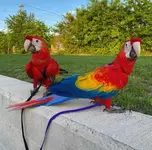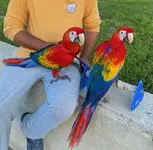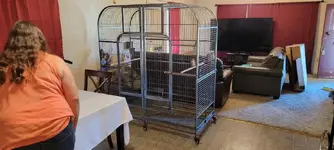Here is a copy and paste of mine for people living with birds:
You can't use scented products or chemicals/fumes in your home (even things that smell nice to us(smoke, perfumes, air freshener, standard cleaners, vaping, burning food, incense, cigs, glue, paint, window sealing kits, polishes, aerosol sprays etc can harm your bird's sensitive respiratory system ( dif from mammals'). Using products that heat or are heated which contain Teflon/PTFE/PFCs = very very dangerous. These off-gas and can kill a bird in under 5 minutes. Teflon/PTFE/PFOA/PFCs are found in the kitchen (pots, pans, cookie sheets, drip trays, air fryers, popcorn poppers, baking mats, crock pots, toasters, toaster ovens, popcorn poppers, waffle irons, electric skillets etc. They can also be found in space-heaters, curling irons, blow-dryers, straighteners, heat lamps, heat guns, irons, ironing board covers etc. These fumes have killed birds through closed doors and on separate floors, so you should replace your cookware with stainless steel, cast iron or ceramic. You may be thinking-- well, I have used them before and my bird is fine, but they kill very inconsistently and it depends on what you are cooking, the age of the pot/pan, the specific bird etc. There was a member who lost many of her birds from a pan she had literally used for years...then one day, her husband cooked an egg (without burning or overheating) and many of them died, while the rest showed signs of respiratory distress.
You will need an avian-safe cleaner to use within your home (both on the bird cage, but also, around the house). Again, chemical cleaners cannot be used in the home unless avian safe. F10 SC (the yellow/clear concentrate) is a great, avian-safe disinfectant. Other (less effective) options include products such as "poop-off", white vinegar + water, grapefruit seed extract + water, baking soda etc. Peroxide is also fairly safe for disinfecting places like your bathroom, but you do not want your bird to come into contact with it.
Some foods are toxic to them--avocado, coffee (even decaf), caffeine, rhubarb, alcohol, onions/garlic/leeks/chives, mushrooms etc. Salt is also very bad for them, as is most human food. They love it, but it's not healthy.
They should not just eat seed--you will want to feed lots of washed fresh vegetables. Fruit is fine in moderation, but too much can lead to obesity and behavioral issues due to sugar. I feed my bird a mix of high-quality seed (no sunflowers, no peanuts) and pellets (in addition to fruit/veg). ECCLECTUS PARROTS SHOULD NOT EAT PELLETS. Fruit pits are toxic, as are apple seeds. Corn cob and certain nut shells (if swallowed in big pieces) can cause blockages, so you should be very cautious if you give your bird nuts in the shell. Peanuts can harbor aspergillosis, and should be avoided altogether (even they you often see them marketed towards parrots).
It is important to make sure that your bird's toys and cage are made of safe metals. Stainless steel is safest. They can get metal poisoning from playing with or mouthing objects made of unsafe metals.
They need a set amount of sleep each night (at least 10 hours) and the largest cage you can manage with lots of different perches. You want to avoid the totally smooth/round ones as they can lead to a condition called bumblefoot. Never place a cage near drafts and never allow cool air to blow on a bird. They are sensitive to drafts and any temperature shift greater than 10 degrees can cause a shock to their system.
They need lots of safe toys and safe wood to chew. Not all wood is safe, so don't just assume you can give them any kind you want. Pressure blasted or chemically treated wood (e.g., lumber and many other types of wood from the hardware contains toxic chemicals or are cut from trees that are naturally toxic.
They hide illness and so you have to watch them to make sure they are eating normally and pooping normally etc. You should try to find an avian vet (certified avian) if at all possible and take your bird AT LEAST 1 x yearly for an exam. An avian vet is NOT the same as an exotics vet who sees birds--- so if a certified avian vet is available within a few hours of where you live, you will want to set up care.
All parrots can easily confuse the relationship with their human for a sexual one. You don't want this to happen, even though it seems sweet at first. Stick to petting on the head and neck only (the rest is sexual) and do not allow your bird to play in shadowy places, like boxes or under furniture, as these spaces are similar nesting sites and are hormonal triggers. NO SNUGGLE HUTS/TENTS!
Food and water should be replaced daily--- wash the containers daily. Never leave wet food out for more than a few hours (as it can lead to bacterial growth). Never try to medicate a bird via drinking water and never add vitamins to water. Vitamins can be over-dosed easily and harm a bird. Plus, when you add things to water, it makes it impossible to know how much they have gotten and it also encourages bacterial growth. Sometimes it can prevent them from drinking adequately if they don't like the flavor of whatever it is you added. Citrus and fruits high in vitamin C should be given in extreme moderation because they can cause "Iron Storage Disease" (for a cockatoo, 1 small tangerine slice 1-2 times a week was okay, according to my vet).
These birds have the intelligence of 3-4-year-old human, but they are wild animals (not domesticated like dogs). This means that they see the world (and humans) in a very unique way and so you must learn about their behavior in order to prevent problems (screaming, plucking etc). They need lots of time out of their cage daily and a lot of interaction (at least a few hours). At the same time, you don't want to spend TOO much time with a bird of they will become overly dependent and not know what to do with themselves when you go to work etc.
Finally, baby birds are ALWAYS sweet compared to adult birds. When your bird hits puberty, expect that it will exhibit some annoying and problematic behaviors (much like a teen). A through knowledge of behavior and setting expectations at an early age will make your life easier when that time comes, but do prepare yourself and expect that things will not always be so smooth-sailing. Think about a baby human compared to a teen...
I am sure there is more...but that is a basic overview of caring for birds.
Here is an excerpt from another post (which you may want to reference when shopping/ calling about Teflon:
The most insidious is the Teflon/ptfe/pfoa/pfcs because you have to call the company to verify that anything that heats or is intended to be heated does not contain these substances ("PTFE free" doesn't mean PFC free and so there are a lot of marketing gimmicks out there to make people buy what seems like healthier cook-ware, even though it still contains a version of the same chemicals). Also-- these chemicals can be woven into fabric, mixed into metal during the moulding process, applied as a powder, applied as a clear-coat, or mixed with a colored coating. You cannot assume that you will be able to identify them visually, so, when you call, you must provide all abbreviations and full names + spellings of each chemical compound (and then they usually give you "the run around" for a week or so IF they ever answer your questions at all---because sometimes it's a "trade secret"). It's all very sketchy and DuPont (manufacturer of Teflon) claims that off-gassing only occurs at really high temperatures, but there have been numerous documented/scientific and anecdotal reports of birds passing away at temperatures in the 300 F range (and again, it kills through closed doors and on different floors).
FYI- Polytetrafluoroethylene (PTFE)
Perfluorooctanoic acid (PFOA)
A perfluorinated compound (PFC)
Teflon (a common brand-name of non-stick cookware containing these chemicals)
10- 12 hours nightly for sleep, so if you get up at 6 and make a bunch of noise, you will wake the bird up (even if they are still covered). If they wake up at 6, bed should be between 6-8. You want to keep it around the same time if possible (because that's how it is in nature).
OH-- something I didn't mention in my last post-- stainless steel is really one of the only safe metals for them. Research the heck out of your cage and make sure that if it uses a powder-coating it is truly non-toxic. Birds can get metal poisoning from playing with sketchy toys (many made in China do not adhere to best practices) and just mouthing things like money, bolts, locks etc can cause toxic impacts...A man I know allowed his bird to play with un-used toothbrushes and (unbeknownst to him) there were small copper bits that held the bristles in place-- this nearly killed his bird even though the bird didn't actually swallow the pieces. Copper, zinc, nickel, some iron, lead etc are all toxic. Chicken wire and most screens= bad news.

 this seems like a good forum to discuss and enjoy being around.
this seems like a good forum to discuss and enjoy being around. I haven't come up with a name, my mom wants to name it Jasper or Sasha but I'm buying the bird and I think I can come up with another good name, we'll see, once I find out its gender maybe on the 30th, I pick it up on the 1st.
I haven't come up with a name, my mom wants to name it Jasper or Sasha but I'm buying the bird and I think I can come up with another good name, we'll see, once I find out its gender maybe on the 30th, I pick it up on the 1st.


 I'm also getting another bird, a green winged macaw I ordered first... but that's another story, may arrive within 3-12 months from some website I made a mistake and don't trust.
I'm also getting another bird, a green winged macaw I ordered first... but that's another story, may arrive within 3-12 months from some website I made a mistake and don't trust.








